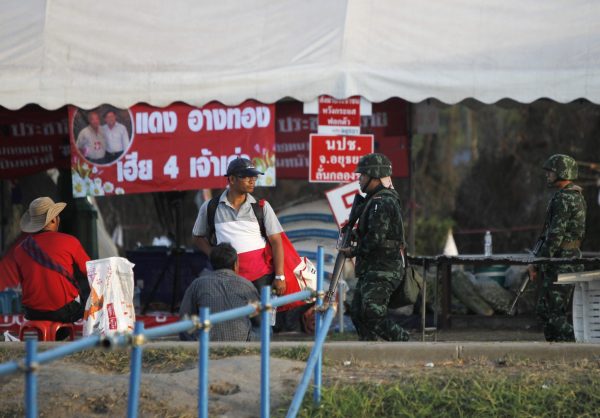There was plenty to dislike about the politics of Thaksin and his proxy successors. Thaksin oversaw a brutal ‘war on drugs‘ that presaged the bloodshed underway today in the Philippines. His dual status as prime minister and oligarch gave rise to brazen conflicts of interest. He regularly used his popularity to overwhelm the authority of independent institutions and made moves to browbeat independent media.
Such overreach became the ostensible pretext for the 2006 military coup, which forced Thaksin into exile and ushered in eight years of brutal political contest between his elite proxies and grassroots ‘red shirt’ supporters on the one hand, and an alliance of conservative–royalist elites and ‘yellow shirt’ activists on the other. To the frustration of the latter camp, pro-Thaksin parties went on to win both post-coup elections in 2007 and 2011, with his sister Yingluck Shinawatra serving as prime minister at the time of the most recent military intervention in 2014.
As Kevin Hewison writes in this week’s lead article, the incumbent junta, led by former general Prayuth Chan-o-cha, ‘seized power determined to avoid the mistakes of 2006: the failure to neuter Thaksin, his parties and his supporters’.
Key to this determination to avoid the ‘failures’ of 2006–14 is to ensure that any elected government is so constrained by ‘[a] confetti of laws and rules reserv[ing] real power for the military, the military-appointed Senate and various state and “independent” agencies’ that it will not be able to consolidate its authority after elections promised for February 2019. New electoral rules also appear designed to encourage a fragmented Parliament and a weak coalition government after any polls.
Indeed, reading between the lines it is clear that ‘the junta has reset Thailand’s political clock to the 1980s and that era’s quasi-democracy’, when then general (now Privy Council President) Prem Tinsulanonda ruled over a neutered Parliament and ‘[t]he locus of political power was in the bureaucracy and the military’. The ‘order’-inducing effects of political repression and sound economic management gave some vindication to this ruling formula, just as it did at the time in similar East Asian military regimes like South Korea and Indonesia.
But Thailand’s society was certainly not depoliticised at that time, and a re-institutionalisation of de facto military rule at the expense of political parties today won’t do anything to paper over the deep geographical and class divisions that gave buoyance to Thaksin’s populism.
Such social divisions don’t make democracy unworkable in Thailand any more than they do anywhere else in the world. Rather, what has made Thailand’s regrettably short periods of competitive democracy so short lived is an inability of one side of the political divide to respect the mandate of a duly elected government to govern, even if they find its policies or its leaders’ conduct and character distasteful.
The solution to Thailand’s political problems is clear enough. The voters must choose their leaders in a free and fair election, and the winning party must have its mandate to govern respected. In the event that a government exceeds fair legal limits, independent institutions and civil society must hold it to account. Immediate resort to turning out a democratically-elected government and to declaring that the voters got it wrong only sustains the grassroots anger that gave rise to populism in the first place.
It was disregard for this reality on the part of Thaksin’s civil society opponents and the opposition Democratic Party that got Thailand into the political mess it is in today, and it is far from certain that Prayuth’s junta can cleanly lead Thailand out of it. Having appeased the Thai public and the international community with the promise of elections, the junta has only encouraged impatience with the status quo. It will face a backlash, even from anti-Thaksin civil society and political parties, if that promise isn’t kept. If the heated and often violent street politics of years past makes a reappearance, then the junta has merely defeated the whole purpose of its own political intervention and has set Thailand’s political development back even further.
The military men in charge and the anti-democratic parties and activists who encouraged their 2014 intervention need to decide what they value more: ridding the system of the influences of Thaksinism at any cost, or making way for the competitive, open and fair political system that Thailand’s increasingly diverse and modern society needs — one that forms the only basis of lasting political peace.
The EAF Editorial Board is located in the Crawford School of Public Policy, College of Asia and the Pacific, The Australian National University.


I deal regularly with Thai businesspeople in my work importing steel for the company I work for in Sydney. Every time I ask them, privately, about the condition of Thai government, they are all quite comfortable with the absence of democracy. They are all middle or upper-middle class, & I can only conclude that the present government suits the interests of most middle class Thais.